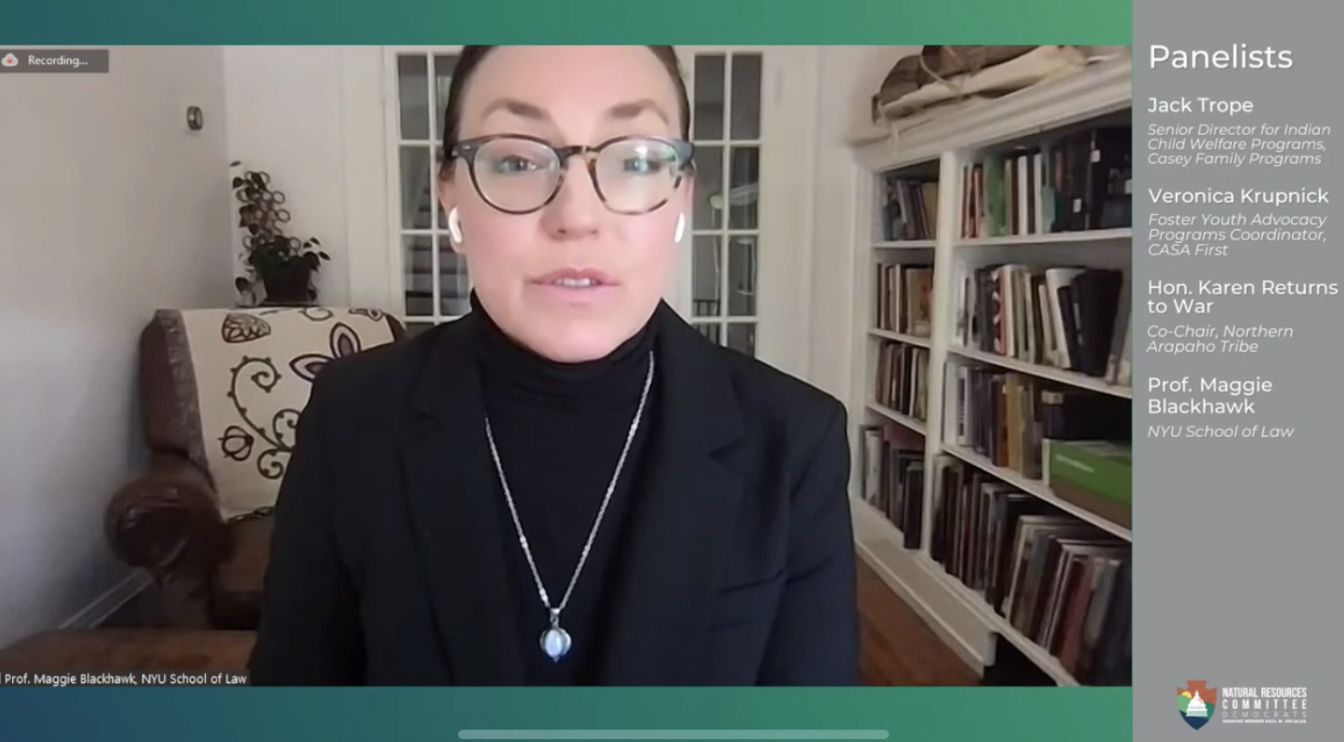
- Details
- By Neely Bardwell
The roundtable, which examined the threat to the constitutionality of ICWA, featured four panelists who provided expert testimony. Panelists included: Maggie Blackhawk (Fond du Lac Band of Lake Superior Ojibwe), professor of law at New York University School; Jack Trope, Senior Director for Indian Child Welfare Programs at Casey Family Programs; Veronica Krupnick, Foster Youth Advocacy Programs Coordinator of CASA First; and Karen Returns to War, Co-Chair of the Northern Arapaho Tribe.
In her testimony, Maggie Blackhawk,connected the dots between Native children being taken from their homes and placed in Indian boarding schools to Native children being placed in foster care and being placed for adoption during testimony.
“Over time, as states assumed more responsibility for the welfare of Native children, they began removing those children from their homes at unprecedented levels,” Blackhawk said. “Eighteen states were explicit that privatizing support for Native children would further reduce welfare costs and fill remaining federal funding gaps because Native children required far fewer welfare dollars when placed in the home of a middle class or wealthy foster or adoptive family than in the home of a Native family living in poverty.”
ICWA was passed in 1978 and provided guidance to state governments in handling child abuse and neglect, and adoption cases involving children with tribal citizenship. The law set minimum standards of accountability and consideration in the event a Native child ends up in the system.
Before ICWA, Native children were systematically separated from their families and communities by state and private adoption agencies without evidence of harm or neglect. Eighty-five percent of these children were placed in non-Native homes. Now, ICWA requires caseworkers in each state to make “active efforts” to keep Native children within their communities.
Public interest in ICWA is at an all-time high due to the impending Supreme Court decision of Brackeen v. Haaland, a case that challenges the act's constitutionality. Arguments took place last November, and a decision is expected in late June.
The primary argument against ICWA is that it discriminates on the basis of race and prioritizes the interest of tribes over the needs of Native children.
Tribal nations and the U.S. Department of Interior responded to the argument of race discrimination by arguing that ICWA is not race-based but instead based on the fact that American Indian tribes and their citizens are a political class, and to challenge ICWA is to challenge Tribal sovereignty.
“Like many other child welfare and adoption organizations, Casey Family Programs considers ICWA to be the Gold Standard for child welfare,” Thorpe testified at Tuesday's roundtable. “ICWA emphasizes keeping children safely with their parents/guardians whenever possible (active efforts requirement) or, if they cannot be kept with their parents/guardians, keeping them connected with their relatives, communities, and cultures (placement preferences, community standards, transfer to tribal court). We know children thrive with their families and in their communities.”
Krupnick shared her personal experience with the child welfare system —she herself was an Indigenous child taken from her community.
“My value, my self-worth became directly tied to how much I believed my now-adopted parents and family wanted to keep me,” Krupnick said. “And with this driving belief—as a child, as a teen, as a young adult—I didn’t even realize I was hurting myself trying to mold into a person that I would never be and abandoning pieces of myself that were incredibly essential to my well-being and my healing. So instead of finding joy and connection and healing in my identity as an Indigenous person, these were replaced with feelings of guilt, anger, shame, and even embarrassment.”
In answer to the question if Congress had the constitutional right to pass the ICWA as posed by the Brackeen v. Haaland case, Blackhawk responded:
“The historical record confirms that the care and education of Native children fall squarely into the constitutional powers of Congress. The constitutional challenges to Brackeen are unfounded and could result in the deeply ironic situation where the constitutional values that we have elevated to reckon with other constitutional failures—specifically, the institution of human enslavement and Jim Crow segregation—might be used to further the American colonial project today.”
More Stories Like This
Navajo Resources and Development Committee Issues Notice on Livestock Inspection RequirementsAmerican Prairie, Tribal Coalition Files Protest Over Rescinded Grazing Rights
Northern Cheyenne Push Back Against Trump Administration’s Effort to Alter Little Bighorn History
Florida Man Sentenced for Falsely Selling Imported Jewelry as Pueblo Indian–Made
Navajo Nation Declares State Of Emergency As Winter Storm Threatens Region
Help us defend tribal sovereignty.
At Native News Online, our mission is rooted in telling the stories that strengthen sovereignty and uplift Indigenous voices — not just at year’s end, but every single day.
Because of your generosity last year, we were able to keep our reporters on the ground in tribal communities, at national gatherings and in the halls of Congress — covering the issues that matter most to Indian Country: sovereignty, culture, education, health and economic opportunity.
That support sustained us through a tough year in 2025. Now, as we look to the year ahead, we need your help right now to ensure warrior journalism remains strong — reporting that defends tribal sovereignty, amplifies Native truth, and holds power accountable.
 The stakes couldn't be higher. Your support keeps Native voices heard, Native stories told and Native sovereignty defended.
The stakes couldn't be higher. Your support keeps Native voices heard, Native stories told and Native sovereignty defended.
Stand with Warrior Journalism today.
Levi Rickert (Potawatomi), Editor & Publisher


